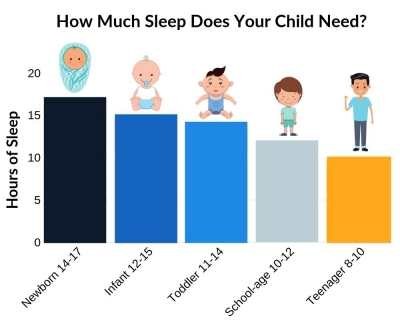
Children and adolescents who do not get enough sleep have a higher risk of obesity, diabetes, injuries, poor mental health, and problems with attention and behavior.1-4
How much sleep someone needs depends on their age. The American Academy of Sleep Medicine has recommended that children aged 6–12 years should regularly sleep 9–12 hours per 24 hours and teenagers aged 13–18 years should sleep 8–10 hours per 24 hours.
During the teen years, the body’s circadian rhythm (an internal biological clock) is reset, telling a person to fall asleep later and wake up later. This change is likely due to the brain hormone melatonin , which is released later at night for teens than it is for kids and adults. This can make it harder for teens to fall asleep early.
Changes in the body’s circadian rhythm coincide with a busy time in life. For most teens, the pressure to do well in school is more intense and it’s harder to get by without studying hard. And teens have other time demands — everything from sports and other extracurricular activities to working a part-time job. Using electronics — including phones, tablets, and computers — also makes it hard to fall sleep. Many teens are up late texting friends, playing games, and watching videos.
Early school start times also play a role in lost sleep. Teens who fall asleep after midnight still have to get up early for school, meaning that they might squeeze in only 6 or 7 hours, or less, of sleep a night. A few hours of missed sleep a night may not seem like a big deal, but it can create a noticeable sleep deficit over time.
Picture Credit : Google




